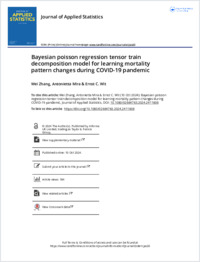Bayesian poisson regression tensor train decomposition model for learning mortality pattern changes during COVID-19 pandemic
- Zhang, Wei Facoltà di scienze informatiche, Università della Svizzera italiana, Svizzera
- Mira, Antonietta Euler Institute (EUL), Università della Svizzera italiana, Switzerland - Facoltà di scienze economiche, Università della Svizzera italiana, Svizzera - Department of Science and High Technology, Insubria University, Como, Italy
- Wit, Ernst C. ORCID Facoltà di scienze informatiche, Università della Svizzera italiana, Svizzera
- 2024
Published in:
- Journal of applied statistics. - 2024, p. 1–23
English
COVID-19 has led to excess deaths around the world. However, the impact on mortality rates from other causes of death during this time remains unclear. To understand the broader impact of COVID-19 on other causes of death, we analyze Italian official data covering monthly mortality counts from January 2015 to December 2020. To handle the high-dimensional nature of the data, we developed a model that combines Poisson regression with tensor train decomposition to explore the lower-dimensional residual structure of the data. Our Bayesian approach incorporates prior information on model parameters and utilizes an efficient Metropolis-Hastings within Gibbs algorithm for posterior inference. Simulation studies were conducted to validate our approach. Our method not only identifies differential effects of interventions on cause-specific mortality rates through Poisson regression but also provides insights into the relationship between COVID-19 and other causes of death. Additionally, it uncovers latent classes related to demographic characteristics, temporal patterns, and causes of death.
- Collections
- Language
-
- English
- Classification
- Economics
- License
- Open access status
- hybrid
- Identifiers
-
- DOI 10.1080/02664763.2024.2411608
- ARK ark:/12658/srd1330231
- Persistent URL
- https://n2t.net/ark:/12658/srd1330231
Statistics
Document views: 73
File downloads:
- Zhang Wei_2024_Appl Statistics_Bayesian poisson regressio: 67
